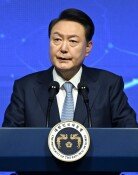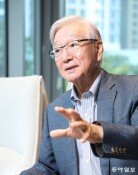Now is the time to climb ‘AI ladder’ first
Now is the time to climb ‘AI ladder’ first
Posted July. 17, 2024 07:43,
Updated July. 17, 2024 07:43
All significant conflicts in the history of technological development stemmed from ‘removing the ladder,’ where frontrunners kick away the technology ladder after they reach the top to prevent latecomers from climbing up. There would be nothing those latecomers can do because those at the top do not reach down to help others. The matter is also directly related to survival. Tens of thousands of years ago, Homo Sapiens could punch a tiny hole at the end of their tools, turning awls into needles. Neanderthals, who did not possess such technology, fell behind and eventually went extinct.
We don't even need to trace back to prehistoric times. South Korea cannot possess nuclear weapons today. The club of nuclear states, including the U.S., Russia, the U.K., France, and China, just removed the nuclear ladder early on once they secured the technology first.
The U.N. General Assembly adopted the Non-Proliferation Treaty (NPT) in 1968, which prohibited non-nuclear-armed states from acquiring nuclear weapons. What NPT claimed on the surface was to guarantee the safety and survival of the human race in the face of nuclear threats. It was a powerful statement and purpose. "Nuclear ladder" was no more.
On the contrary, however, the club of nuclear states conducted more nuclear tests and possessed more nuclear weapons. This means that countries that already have them will always have them, and those that don’t will never get them. South Korea was left in a situation where it had to rely significantly on other countries for its survival.
The narrative around the nuclear ladder is similarly unfolding in the realm of Artificial Intelligence (AI). AI is considered one of the key technologies that will determine the future of humanity, just like nuclear weapons. It is widely believed among experts that whether a nation has advanced AI technology or not will decide its future advancement.
The signs of removing the ladder are already showing. The European Union (EU) will officially implement the AI Act, an AI regulation law, starting August 1. Last October, the United States also began regulation through President Joe Biden’s ‘AI Executive Order.’ The pretext is to protect human values and dignity from rapidly advancing AI.
The justification for regulation is noble. However, we must not be deceived by this and miss the hidden agenda behind it. Regulation is removing the AI ladder. The ones most affected by the EU and US regulations are not the leading AI companies in the U.S., but the latecomer companies in countries like South Korea.
The South Korean government proposed the AI Framework Act to promote and nurture AI technology and related fields. However, amid intense bipartisan confrontation, the bill did not pass the legislative hurdle during the outgoing National Assembly. The bill will be reintroduced during the 22nd National Assembly, and concerns are rising as the discussion surrounding the issue goes astray.
The principle of allowing first and regulating later, which aimed to promote AI technology, is no longer valid. Regulations surrounding AI are heading toward strengthening them. Several civil society groups with liberal tendencies are working together to track and analyze the regulation moves by the EU and the U.S., including the Jinbonet and the Institute for Digital Rights.
It is, of course, essential to prevent and address AI-triggered disasters by regulations. However, South Korea is not yet a strong AI nation. It hasn’t climbed high on the AI ladder. Now is not the time to hold ourselves back but to hurry up and climb the AI ladder. Like the nuclear ladder, the AI ladder will soon be removed. The regret of only looking up from below and the impending survival crisis could be several times greater than during the nuclear era.
Headline News
- Shin Hanul 3 and 4 nuclear power plant construction resumes
- Political leaders and doctors struggle to convene a council
- Trump sparks debate with false claims, Harris criticized for job numbers exaggeration
- Money Lending Act amendment bill to begin this month
- Washington puts pressure on Seoul to join chips regulations on Beijing







